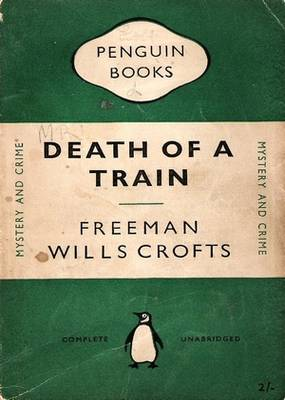The more books by Freeman Wills Crofts I have read, the more I have come to appreciate the scale of his ambition as a detective novelist. Of course he had limitations as a writer; his prose was serviceable but unexciting and seldom evocative, while his characterisation straightforward and often unsubtle. But, having established himself early on as a master of the police investigation mystery, he wasn't content to keep turning out the same-old, same-old, and for that he deserves a good deal of credit. His 'inverted' mysteries in particular were often excellent, and his plotting was consistently meticulous.
Death of a Train, written late in his career, shows Crofts trying to do something different while still featuring Chief Inspector French in a central role. The title is, I think, pleasing and tantalising. The book was published in 1946, but is set in the summer of '42, when victory over Hitler was far from assured. Essentially, this is an espionage thriller with detective elements grafted on. The result is a curious mixture of the interesting and the banal.
We begin with discussions within the War Cabinet. Vital supplies are needed in North Africa, but it's essential that the enemy doesn't get wind of the plan to send them over, for fear of interception. So a detailed plan is formulated to send the supplies by train. My Penguin paperback describes the elaborate set-up as making for 'wholly engrossing reading', but I'm afraid I found it tedious. When, on page 46, Crofts writes that 'the shunting seemed to drag out interminably', he might have been writing about his own method for starting a crime novel. His love of railways led him astray: there's simply too much technical detail. Things only get going once an attempt to derail the train takes place: 'the enemy within' is the obvious suspect.
French is called in to investigate, but because of the need for secrecy, he pretends to be looking into the abduction of a senior officer, a fake plan which complicates the story without adding much to it. Nevertheless, the book has some merits, and it's sobering to get a clear reminder of how desperate and anxious people were when the future of the country was at stake. There's some good detective work, plus action scenes in the closing pages, but the baddies are two-dimensional and again there's a lot of less than exhilarating technical stuff about how their nefarious schemes were carried out. I was, however, fascinated to read of French's admiration for R.Austin Freeman and Dr Thorndyke - we're told that he read the Thorndyke stories 'for what they could teach him'. Quite a tribute.

5 comments:
This is unreadable, even by Crofts’s extraordinarily dull standards. I couldn’t get through the first C-section.
I found the whole book to be most readable.! There were so many good ideas in amongst quite a lot of ( perhaps a little dense ) technical detail . This reader would rather learn some new stuff ,than spend pages not caring about a detective's inadequate marriage/drinking/OCD/ etc etc.
Overall , it is just fun to see how good GAD detection can prove its ability to cause disagreements and make good /fun/ angry/ impassioned comments without having recourse to physical actions.
BUT,,,why not a new novel where these arguments are taken to a whole new level ...a task for a very good writer...Martin ??!!
Nick, Anon, thanks for your contrasting reactions! I'm very interested to see a range of views. As for a new novel, well, you never know...
I started trying to read this soon after visiting the Cabinet/Churchill War Rooms. I’m on a train to London again and will pick up the story where French enters. I had to re-start several times, getting bogged down in the committees and the sleight-of-hand with the packing of supplies. Something seemed off about the plan but I couldn’t find any real flaw in it. I quite enjoyed the detail of signalmen, train cleaning, and engine crew. I don’t really care much about railways but I decided to appreciate this opportunity to benefit from the expertise of my esteemed friend FCW.
I think of FCW every time I approach the lift at my home station. Beside it is a sign alerting us that Pit Props are stored behind a neighbouring panel. How many of them harbour smuggled brandy?
Now that is a very good question!!!
Post a Comment